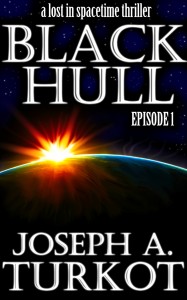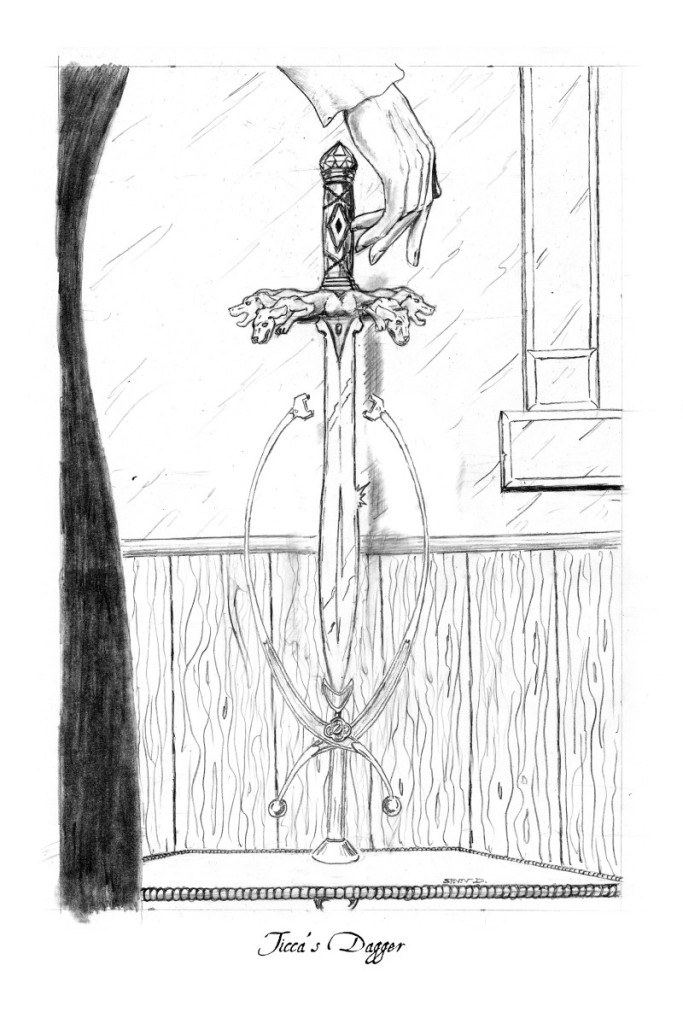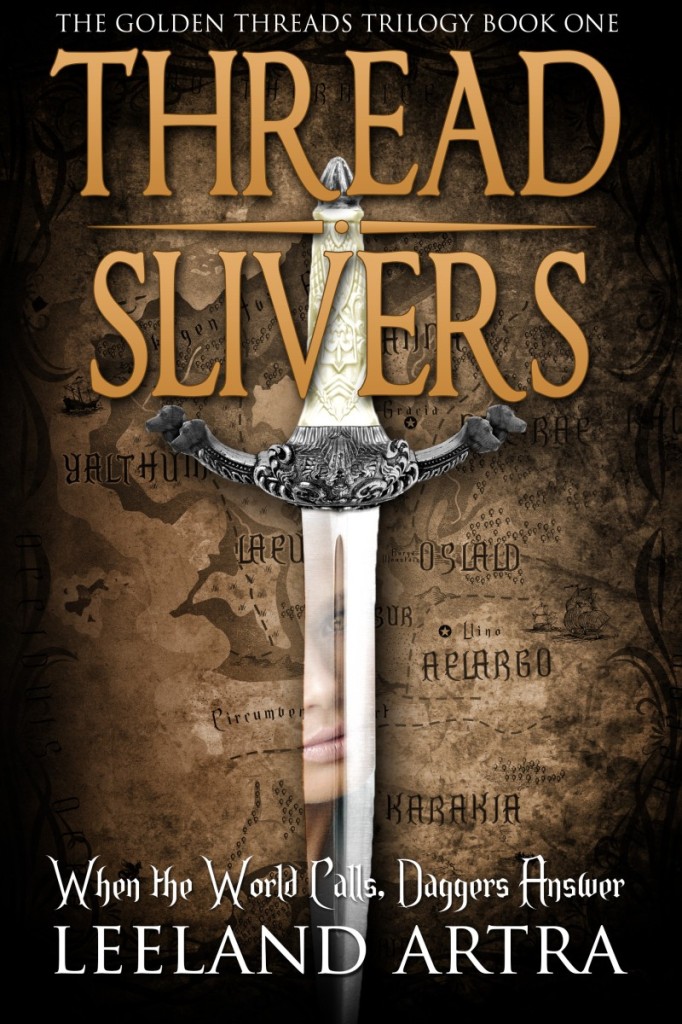Forged in Blood I: Chapter 1
Wind gusted across the abandoned stadium, rattling chains on flagpoles and stirring the fresh snow coating the rows of stone benches. In the chilly, predawn air, Amaranthe Lokdon stood atop the highest wall, the cold rim of a spyglass pressed to her eye. The empty arena opened to her right, while the cold black lake stretched to the left. A million-people dense, the capital of the Turgonian Empire, long ago nicknamed Stumps for its bevy of beheaded statues, spread out in front of her for miles and miles.
One might have expected dormancy at that early hour, but numerous trolleys and steam vehicles navigated the city, and a disturbing number of uniformed people marched along the sidewalks. Some of the soldiers bore flintlock rifles, but many carried the sleek, new weapons Forge had commissioned, weapons that could fire several self-contained cartridges with no need for the separate loading of powder and ball. Out on the lake, all manner of military vessels plied the frosty waters with a number of them forming a blockade across the river to the south.
A locomotive chugged past the stadium, slowing as it approached the city, sooty plumes wafting from the smokestack and blending into the gray sky. It was a black military transport, and Amaranthe had little doubt that it was full of troops, though she didn’t know if they were for General Ravido Marblecrest or one of the other potential candidates to the throne. All she knew was that none of those troops were coming to support Sespian; as far as everyone in the city knew, he was dead.
“You are silhouetted against the sky,” Sicarius said from behind her shoulder.
Amaranthe hadn’t heard him join her on the wall. Not surprising. “It’s a little early and cold to worry about snipers gamboling about, don’t you think?”
“No.”
Of course not. Neither the frosty heart of a glacier nor the molten core of a volcano would have ever kept him from his duties when he’d been Emperor Raumesys’s assassin. Nor, she reminded herself, had such ever kept him from fulfilling his duties when he’d been working for her. With her, she corrected. Though he acknowledged her right to lead the team she’d assembled, he still had a tendency to do things his own way when something truly mattered to him.
“If the people behind those snipers were smart, they’d be more interested in recruiting us than shooting us,” Amaranthe said. “We’ve proven a great aptitude for defeating soldiers through cunning, athleticism, and an uncanny knack for blowing things up at the right time.” She admitted it might be more luck than an uncanny knack, but thought her word choice might draw a semi-amused snort from him. As a whole, her men had been grim during the last few days of their overland trek, with the newly amorous Maldynado and Yara being the only exception. They’d been too busy playing swat-and-grope with each other to be bothered by the rain, snow, and hail that had pounded the team as it dodged patrols and skirted checkpoints full of soldiers. She’d struggled to keep her own grimness off her face as well, reflections of the ghastly dreams that stole her nights and sometimes, when she let her mind wander, tried to steal the days as well.
No hint of amusement came from behind her.
“With all this going on—” Amaranthe waved toward the boats, train, and troop-filled streets, “—I doubt anyone will notice us up here.” She lowered the spyglass and crunched about on the snow to face him. “Most of the officers leading troops about down there aren’t aware that we have tiles in the game, and I doubt Ravido is going to waste time looking for us until he finds out Sespian is here.” Maybe not even then if Forge published the news about Sespian’s… dubious parentage, and the Company of Lords dismissed his claim to the throne.
As always, Sicarius’s face might have been chiseled from granite for all the insight it gave into his thoughts. Though the weeks of travel and battle had wreaked havoc with everyone else’s wardrobe—Maldynado was still lamenting the loss of his most recent hat—Sicarius looked the same as always, adorned with copious daggers and throwing knives, and lean and muscular beneath his perennial black shirt and trousers. Somehow he’d even obtained a fresh pair of the soft black boots that allowed him to glide through the shadows without so much as a whisper. Once, in a fit of mischievousness, Amaranthe had absconded with those boots for long enough to try them on and find out if they held any magical silencing properties. Alas, the size difference had only granted her with magical clumsiness, and she’d tripped, rammed her hip against a table, and knocked over a chair. After recovering from the ungainly move, she’d found Sicarius watching her from behind. She’d returned the boots sheepishly, unable to come up with an explanation that he wouldn’t find utterly silly.
“Forge knows we are here,” he said.
“They’re not the types to send snipers though. I don’t think they can knock me from the wall with dastardly political or financial machinations.”
Without comment, Sicarius hopped down from the wall. The cool glance he sent back over his shoulder meant he expected her to do the same.
Amaranthe sighed and followed him down the stairs and out of the stadium. Since escaping from Pike’s torture chamber, she’d teased more conversation, and even some playfulness, out of him, but he wasn’t in the mood for it today. Rightfully so, she supposed. It was time to be serious.
“See anything good?” Akstyr asked, when she rejoined the team in the shadows of a tree between the stadium and the train tracks. Actually the team occupied the shadows of a few trees. With the addition of Sespian and Yara, her group had grown of late. Eight people, including herself. It seemed like a tremendous number of expectant eyes turned in her direction, though she feared the number would be far too low to make a difference in the city, in deciding who sat upon the throne when the snow melted in the spring.
No, she couldn’t think that way. They could make a difference. Upon many occasions, small numbers of people had been responsible for great changes in history.
“I saw a good… challenge,” Amaranthe said.
Akstyr brushed a few snowflakes out of his spiky ridge of hair—it was green this week. “A challenge? That means a whole lot of injury and death with absolutely no pay, right?”
“There may be some pay.” Amaranthe watched his face as she spoke, expecting a sullen expression and a threat to leave for the Kyatt Islands, the one place he believed he could study the mental sciences in peace.
Akstyr only said, “Ah,” with resignation hunching his shoulders as he dipped his hands into his pockets.
Books lifted his head from an open journal long enough to say, “That’s not precisely the dictionary definition,” before his gaze was inevitably dragged back downward. The book-stuffed rucksack hanging from his shoulders must have weighed close to a hundred pounds. Amaranthe wondered if he’d ever thanked Sicarius for the months of arduous training that allowed him to carry such a load. Probably not.
“Where to first, boss?” Maldynado asked. He and Yara stood a few paces away, not quite touching but standing shoulder-to-shoulder in a pose that said, “Yes, we are a we now, thank you very much.”
Amaranthe wished she could get Sicarius to stand next to her that way, when there were actual witnesses looking on, but that would probably have to wait until they were finished here and the fate of the empire had been resolved. One way or another. She glanced at Sespian, who’d been in the middle of a sign-language conversation with Basilard when she walked up. They’d stopped and waited attentively.
“Well,” Amaranthe replied, meeting everyone’s eyes before she continued, “as I’ve warned a few of you, I have a plan.”
“That’s why everyone is watching you with looks of concern,” Yara said, her voice still gruff and no-nonsense despite whatever cuddliness Maldynado might have drawn out in private.
“And here I thought they were gazes of trust and adoration.” Amaranthe supposed Yara was officially one of the team now if she’d joined with the teasing.
Sicarius, who had set himself up a few paces away, where he could see all the roads and paths an enemy might take to approach the group, gave Amaranthe a cool, get-to-business look. So much for gazes of adoration.
“Before I unveil my plan,” Amaranthe said, “we need to do some intelligence gathering.” A large part of her plan involved infiltrating Forge, and, right now, she had no clue as to where they might be.
Basilard nodded—the gesture might have had a tinge of relief to it. Did they think she’d go barreling into the city, hurling explosives, without finding out exactly what they were facing? Perhaps a couple of her schemes had been a tad extemporaneous of late.
We must learn who controls the majority of the forces, he signed, and if Forge has regrouped and arrived yet.
“Agreed,” Amaranthe said. “That’s why Maldynado and I are going to visit his old journalist friend, Deret Mancrest.”
This time Sicarius’s look had a baleful undertone.
“With his resources, he ought to know what’s going on in the city,” Amaranthe said. “Also, given that his newspaper’s been prematurely reporting Sespian’s death, among other Forge-favoring tidbits, I want to find out if he’s in the coalition’s pocket, being coerced to write their stories for them, or—”
“Is open to being wooed to our side?” Books suggested.
“Didn’t we already woo him once?” Akstyr asked.
Perhaps men only stay wooed so long as the wooing influence is present in the area. Basilard pointed to Amaranthe.
Maldynado raised a finger. “Is anybody else concerned with how many grown men are using the word ‘woo’ here?”
Amaranthe made a chopping motion to halt the tangent. “While Maldynado and I are looking for Mancrest, I’d like Basilard, Yara, and Akstyr to locate a promising hideout for us. While you three are doing that, you can mill about on the streets, listen in on conversations, and tease out what tidbits you can from the general public. I’m sure I don’t have to remind you to keep your hoods up and your faces in the shadows. Many of us are still featured on wanted posters, and Forge may have bounties out on everyone by now.”
Yara’s lips twisted into a sour expression. She might be lamenting her choice to stay with them. If so, she didn’t say anything. Those deadly rockets the team had uncovered on the steamboat ride back upriver seemed to have convinced her that, even if Sespian wasn’t the undisputed heir any more, it was worth risking her career to keep Forge from playing puppet master to the new emperor.
“Where are we all going to meet up in the meantime?” Maldynado asked. “Until we find a suitable secret hideout, and, as long as we’re on the topic, might I suggest an above-ground hideout without any vermin, scat, urine, or otherwise unsavory leavings in the area? I know the boss is handy with a broom, but she might not have time to clean things up for us for this mission.”
Yara took a step away from Maldynado. “Handy with a broom? Clean for us? Are you telling me that you need Corporal Lokdon to tidy up after you?”
Maldynado avoided her eyes. “Not me specifically, but, uhm.”
Amaranthe watched the exchange with some amusement. She was certain her fastidious streak had been brought up in front of Yara before, but perhaps her new relationship with Maldynado inspired her to want to… hammer him into the mold, as the marines liked to say of their young recruits.
“I’m positive that Basilard, Akstyr, and Yara will find a suitable hideout,” Amaranthe said to keep Maldynado from getting himself into trouble. More trouble.
“Hot water and indoor plumbing would be appreciated,” Books said with a weary sigh, one that spoke of being ready for a year’s worth of hardship to come to an end.
Amaranthe could understand that; she wouldn’t mind easy access to hot baths either.
“I notice you haven’t assigned Sespian, Sicarius, or myself to tasks yet,” Books went on. “Is that because you know it’s important to leave me to my current project?” He tapped the open tome in his hands. “I’m close to having a preliminary constitution fleshed out.”
“That’s good news, but no,” Amaranthe said. “I’d like you to go with Sespian and Sicarius.”
Books blinked a few times. Meanwhile, Sespian eyed Sicarius warily out of the corners of his eyes. He’d grown less vocal about his distaste, but he hadn’t noticeably warmed up to the idea of having an assassin for a father.
“Go where? And to what end?” Books asked.
“As soon as people from that Forge meeting get up here, if they haven’t already, we can expect a newspaper announcement that shares the truth of Sespian’s heritage. Maybe they won’t bother as long as they believe he’s dead, but as soon as we present him as the rightful heir to the throne, they’ll seek to discredit him.”
“Correctly so,” Books said. “If his father is of lowborn origins, his claim to imperial rule comes only through his mother’s side.”
Sicarius’s flat expression turned toward Books. He probably didn’t care if he was “lowborn” or not, but Books squirmed and lifted an apologetic hand beneath the stare.
“True, but his mother’s line gives him as good a claim as many of the other potential candidates,” Amaranthe said, “with the possible exception of Ravido, thanks to the Marblecrests’ not-so-distant history with the throne, but what if Sicarius isn’t of lowborn origins?”
“What do you mean? We don’t know who his parents were, do we?” Books pointed at Sicarius.
“No,” Amaranthe said, “but we can surmise that Hollowcrest chose based on intelligence and physical prowess, hoping the offspring would receive the traits of the parents. If some notable Crest man were involved, the populace—and the Company of Lords—might find Sespian’s pedigree more appealing.”
“A Crest?” Maldynado sounded affronted as he regarded Sicarius with new eyes.
“For all we know, Fleet Admiral Starcrest could have been his father,” Amaranthe said.
A wistful expression flashed into Sicarius’s eyes; it was gone so quickly she doubted anyone else noticed it.
Books scoffed. “Starcrest wasn’t blond.”
“Not many Turgonian men are,” Amaranthe said. “Maybe Hollowcrest picked a Kyattese, Mangdorian, or Kendorian woman to birth him, in hopes that his features would be less classical empire, and that he’d be able to blend in when visiting other countries.”
“Visiting,” Sespian muttered.
Amaranthe ignored the grousing. She couldn’t blame him for that one. Visiting was an innocuous word for what Sicarius had really been doing when he entered other nations.
“This is baseless speculation,” Books said.
“At this point, yes. That’s why you’re going to research his heritage.”
Amaranthe met Sicarius’s eyes, wondering how he’d feel about having other team members prying into his past. She could send him alone—his records were probably in the Imperial Barracks somewhere, if they existed at all—but thought Books might have some useful insight into genealogy studies, should Hollowcrest’s notes prove difficult to decipher. Sicarius didn’t avoid her gaze, but he was being inscrutable, as usual.
“Is it necessary that I go?” Sespian asked, then rushed to add, “Someone should check on Fort Urgot and see what’s going on there.” It sounded like an excuse.
“Fort Urgot can wait,” Amaranthe said. “Aren’t you curious who your grandparents might be on your father’s side? What if they’re still alive?”
Sespian opened his mouth, but shut it again without saying anything. Sicarius’s eyebrow twitched ever so slightly. Surely he’d wondered before if his parents were still alive. Or maybe that twitch meant he already knew they weren’t.
“Whatever records remain of my training and inception would be in Hollowcrest’s office,” Sicarius said. “If his office hasn’t been disturbed.”
“It hasn’t been moved,” Sespian said, “but Forge owns a number of my… the intelligence officers who work in the Barracks. I’m sure it’s been searched.”
“But Forge didn’t have any knowledge of your true heritage until…” Amaranthe winced, reminded that she’d been the one to release the hounds, however inadvertently.
“Hollowcrest was secretive in matters related to my upbringing,” Sicarius said. “The documents would have been hidden.”
“Good,” Amaranthe said. “Maybe they’re undisturbed then. If you three can find something favorable to counteract the questionable nature of, ah…” She extended an apologetic hand toward Sicarius. The empire might be full of war-loving soldiers, but it favored those who won battles bravely and openly, not by sticking daggers in people’s backs. “It’ll be easier to put Sespian forward as the most promising scion if we acknowledge the truth. It’ll come out anyway, but maybe we can put a palatable sauce on it.”
Sicarius’s grunt had a skeptical undertone.
“At the very least,” Amaranthe said, “we’ll need to know who currently holds the Imperial Barracks.”
“The last time I attempted to enter them, they were warded.” Sicarius eyed Akstyr.
Without hesitation, Akstyr raised his hand. “I’ll go and check them out.”
Eager, eh? Amaranthe wondered if it was the chance to study another practitioner’s work that interested him or if he was concerned about being seen on the streets. She didn’t know how many thugs would be searching for him—his bounty wasn’t as high as hers, and nowhere near Sicarius’s, but the gangs had more eyes on the street than the enforcers, so they might represent more of a threat. Things were also more… personal with them. She’d have to do her best to keep Akstyr out of sight until they could deal with the bounty or he could escape the empire. Though he hadn’t always been her most earnest worker, he didn’t deserve to have his loyalty rewarded with a crossbow bolt in the chest.
“So, this leaves only Yara and Basilard to locate our new hideout?” Maldynado shook his head. “We’re going to get something sparse, I know it.”
“Are you whining?” Yara asked.
“No, that was observing.”
“What’s the difference?”
Maldynado snapped his fingers. “Professor Booksie? Would you care to explain?”
“How a grown man can justify constant complaining to his lady?” Books tapped his bulging rucksack. “None of my texts has an answer to that.”
“Let’s get started,” Amaranthe said before Maldynado’s sputtered protest could evolve into fighting words. The gray plumes of smoke from the locomotive had faded, and fresh troops were already piling into the city. “We’ll meet in the alley behind Curi’s Bakery at midnight.”
* * *
A faint breeze stirred the darkness in the underground passages, bringing the scents of fresh snow and damp fir needles from the Emperor’s Preserve. They’d entered the tunnel system through a hidden and booby-trapped gate in the park a half a mile back, one Sicarius had used often in the past. Hollowcrest hadn’t wanted anyone to know an assassin in the emperor’s employment came and went in the Imperial Barracks. The mundane booby traps were not a problem. The newly added Science-based ones were a different matter.
Sicarius followed his nose back to the spot where he’d left the others. The air also carried mold and mildew spores, along with the sharp tang of pine tree resin mixed with bear grease. Akstyr’s hair concoction. The smell of ink verified Books’s presence. Sespian’s scent was more subtle, and Sicarius heard his soft, steady breathing before identifying him in an olfactory manner.
Before speaking and betraying his presence, Sicarius listened, smelled, and touched his fingers to the damp, coarse stone of the tunnel floor, testing for vibrations that would indicate footfalls nearby.
“Maybe he’s going to leave us here all night,” Akstyr muttered.
“If so, I’ll be most put out,” Books said.
“Because you didn’t bring your work with you?”
“Precisely. He said I couldn’t bring my books because they’d slow me down.” Books sniffed. He carried only a lightweight satchel with matches and lanterns.
“The man is truly a tyrant,” Sespian said, his tone dry.
“No argument there,” Akstyr muttered.
Having determined that nobody else approached—despite the distracting babbling of his own colleagues—Sicarius lifted his hand from the stone floor. “I have verified the existence of a ward guarding the Barracks entrance.”
Surprised scuffles sounded, along with the thud of flesh bumping against stone. Books cursed beneath his breath. Sespian stirred—uneasily?
Sicarius knew that his soundless approaches startled others, though he did not know why they so often showed signs of discomfort when they realized he’d heard them talking about him. He did not care if they spoke of him during moments of inane chatter, so long as they were not plotting harm toward him.
“I do not believe it has been disturbed since I came this way last summer,” Sicarius continued. “Akstyr, come.”
Akstyr sighed but did not otherwise object to the command.
Books took a step and banged his knee against the wall.
“If nothing except magic is down here, can we risk a light?” Sespian asked, the material of his sleeve rustling, followed by a pat, suggesting he’d offered Books a hand.
“The Science,” Akstyr corrected.
Sicarius would have preferred to continue in darkness, but knew the other men’s senses were not honed appropriately. “It is unlikely we will encounter another until we enter the basement. Or trigger the ward.”
“Good.” Akstyr snapped his fingers, and a soft ball of blue light burned into existence.
Sicarius put his back to it to preserve what he could of his night vision and led the way deeper into the tunnel system. Few people knew about the passages. If the curious way Sespian regarded the damp, rough walls was an indication, their existence was new to him too. Raumesys had prepared him poorly. Perhaps because, from what little Sicarius had witnessed of the boy’s upbringing, the old emperor had never been impressed with his successor. Even before Sespian had come of age, Hollowcrest had been speaking of arranging a marriage for him so he’d produce an heir early on. So they had an alternative should Sespian one day disappear?
A strident twang plucked at Sicarius’s senses, and he slowed down, extending a hand to stop the others. He hadn’t heard or smelled anything, nor had he felt the mental sciences being used, but something was amiss.
Behind him, the men halted without saying a word. In his peripheral vision, he spotted hands dropping to swords sheathed on belts.
Ahead, Akstyr’s light illuminated a dead end, one that appeared to be of natural origins. It wasn’t. There was a stone door, one designed to only allow an exit, not an entrance, but Sicarius knew a way around the locking mechanism. They hadn’t reached the secret door yet, though. He’d stopped a dozen meters from it. He’d sensed…
No, that was the problem. He didn’t sense anything. The ward. It’d been right here. His training had included enough exposure to the mental sciences and practitioner-crafted devices that he knew when he was in their presence. Five minutes earlier, a chunk of the stone wall had been emitting a telltale aura. Now, he felt nothing.
The faintest hint of an odor touched his nostrils. Smoke. Pipe smoke, though the particular tobacco blend wasn’t anything imperial men favored. It had a resiny underpinning, one that teased his memory. Nurian rek rek. One of his old tutors had smoked it.
He sniffed the air again, trying to verify that identification, but the faint scent proved elusive. Nobody had been smoking in the tunnel, he decided, but someone might have passed through wearing clothing that had been near a smoker.
“Akstyr,” Sicarius whispered. “Do you sense anything?”
“No. Should I?”
“There is a ward here.” Sicarius pointed to the spot on the wall. Even before, there hadn’t been anything tangible to touch or visible to the human eye, but he was certain that it’d been located there. “Now it is gone. Or it has been triggered.” He was reluctant to admit that he could have failed to notice another person in the tunnels, but had to inform them of the possibility. “Someone else may be down here.”
“I don’t sense anything.” Akstyr shuffled over to the spot. “Are you sure you didn’t imagine it in the first place?”
“I am certain.”
“Really? Because you’re not a practitioner.”
Books sucked in a breath, as if he feared Sicarius would lash out at Akstyr for daring to question. Were Sicarius going to punish the youth for impertinence, he would have done it the day they met. He did let his tone chill when he repeated, “I am certain,” thus to discourage further argument.
Akstyr closed his eyes and ducked his head, his upswept ridge of hair bobbing. He placed a hand on the wall.
“If someone triggered the trap, so to speak,” Books said, “should we abandon this mission? At least for tonight?”
“Hoping to get back to your work?” Sespian murmured.
“Partially. Partially I’m concerned for our safety if someone was skilled enough to sneak past Sicarius without his noticing. Or any of us noticing,” he rushed to add, perhaps feeling he’d offered an insult.
Sicarius ignored the slight. He, too, would find cause for concern if someone had bypassed him without a whisper. Perhaps the person had been there first and had been waiting to deal with the ward until Sicarius left. That idea didn’t grate at him any less, for it would have meant he hadn’t been paying as much attention to his surroundings as he should have been, but he’d find that more plausible than the notion that someone had sneaked past him in the dark.
“I found it,” Akstyr said. “The ward. It wasn’t tripped.”
“That’s a relief,” Books said.
Was it? What had happened then? Sicarius waited for a further explanation.
Akstyr tapped the stone wall. “It’s been disarmed.”
“Disarmed?” Sicarius asked, his tone sharper than he’d intended. Long ago, Hollowcrest and various tutors had drilled into him the importance of maintaining a neutral facade and giving away nothing through expression—or timbre of voice. He wondered, sometimes, if so much time spent amongst men—and women, he added to himself, thinking of Amaranthe—was affecting his ability to distance himself from humanity, from his own frail human side. “Disarmed how?” he asked, making his tone calm and emotionless again.
“It’s like… if this were a mine… someone had left the casing and detonator and stuff in place, but removed the charge,” Akstyr said. “It’s something only a practitioner would know how to do.”
“This could be done swiftly?” Sicarius was certain he’d been gone for no more than five minutes.
“If someone had practiced enough, I guess.”
“Are you telling me that a wizard sneaked into the Barracks just ahead of us?” Sespian whispered.
“Practitioner,” Akstyr corrected.
Ignoring him, Sespian focused on Sicarius. “To what end? Are they trying to beat us to your records? How would they even know we sought them?”
“I doubt this person’s presence has anything to do with me,” Sicarius said.
The others exchanged dubious looks.
Sicarius refused to doubt his statement. Until Amaranthe had voiced her new interest in digging into his past, nobody had been contemplating such matters. Nor had anybody been around spying on their conversation earlier in the day. “It is more likely that another assassin has entered the Barracks.”
Such an occupation would explain the person’s stealth.
“A wizard assassin?” Sespian asked. “Who’s the target?” He didn’t point to himself, but he didn’t need to. After being a target for so long, he must have learned to worry about his life. Good. Paranoia kept one alive.
“Perhaps Ravido or whomever has taken over the Barracks,” Sicarius said.
“Hm, yes.” Books stroked his jaw. “If the newspapers speak the truth, the competition is going to be noticeable—and bloody—over the next few weeks. There’s an entire empire at stake here.”
“We will enter and attempt to avoid the other intruder,” Sicarius said, though their errand to Hollowcrest’s office would take them to the same floor and hallway that housed the imperial suites. If Ravido had taken the Barracks for his own, he may have decided to set himself up in Raumesys’s old rooms, something an assassin clever enough to disarm magical traps would soon deduce.
“What if we’re not able to do that?” Books asked quietly. “An assassin with a practitioner’s skills sounds formidable.”
“We too are formidable.” Sicarius headed for the secret door, though a niggling thought followed him, one that suggested someone who had evaded his notice in the tunnel might be more than formidable.
* * *
The novel is now available at Amazon, Smashwords, Barnes & Noble, Apple, and Kobo.








